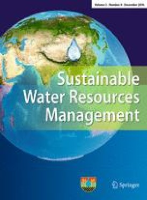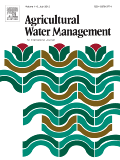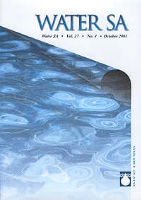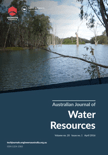
Sustainable Water Resources Management
Scope & Guideline
Pioneering research for a water-secure future.
Introduction
Aims and Scopes
- Sustainable Water Management Practices:
The journal highlights research on sustainable practices for the management of water resources, including conservation techniques, efficient water use in agriculture, and the development of water-saving technologies. - Water Quality Assessment and Management:
A significant focus is placed on assessing water quality, investigating pollution sources, and proposing remediation strategies to ensure safe water for drinking and irrigation. - Hydrological Modeling and Climate Impact Studies:
The journal publishes studies involving hydrological modeling to understand the impacts of climate change on water resources, including precipitation patterns, streamflow variability, and groundwater recharge. - Geospatial Analysis and Technology Applications:
Research employing GIS, remote sensing, and other geospatial technologies to evaluate water resources, map potential zones for groundwater, and assess flood risks is a core area of the journal. - Socio-Economic and Policy Aspects of Water Management:
The journal explores the socio-economic dimensions of water resources management, including community engagement, policy frameworks, and the socio-ethical implications of water governance.
Trending and Emerging
- Integrated Water Resources Management (IWRM):
There is a growing trend towards research that emphasizes the integration of various water management strategies, combining surface and groundwater management, and considering societal impacts. - Climate Change Adaptation Strategies:
Research that explores adaptive strategies for water resources in the context of climate change, including resilience-building and impact assessment, is increasingly prevalent. - Use of Machine Learning and AI in Water Management:
The application of machine learning and artificial intelligence for predicting water quality, optimizing resource allocation, and modeling hydrological processes is gaining traction within the journal. - Community-Based Water Governance:
Emerging studies focusing on community participation, local knowledge integration, and the socio-political dimensions of water governance are becoming more prominent, reflecting a shift towards inclusive management practices. - Innovative Water Treatment Technologies:
There is an increasing interest in novel water treatment methods, including bioremediation and advanced oxidation processes, as solutions to emerging contaminants in water systems.
Declining or Waning
- Traditional Water Supply Infrastructure Studies:
Research focused exclusively on conventional water supply infrastructure, such as dams and pipelines, has decreased as attention shifts towards more integrated and sustainable approaches to water management. - Single-Factor Pollution Studies:
There is a notable decline in studies that focus solely on individual pollutants without considering the broader context of water quality and multiple stressors affecting water bodies. - Historical Water Management Practices:
Papers centered around historical water management practices are becoming less frequent as the emphasis moves towards innovative and contemporary solutions to current water challenges.
Similar Journals

Agricultural Water Management
Elevating Knowledge for Effective Water Resource ManagementAgricultural Water Management, published by ELSEVIER, is a leading journal in the fields of agronomy, soil science, and water resource management. With an impressive impact factor reflecting its relevance and authority—ranking Q1 in multiple categories including Agronomy and Crop Science, Earth-Surface Processes, Soil Science, and Water Science and Technology—the journal serves as a critical platform for groundbreaking research and innovative practices aimed at enhancing agricultural sustainability and efficient water use. Operating since 1976, it has maintained a strong commitment to disseminating high-quality scholarly work that addresses contemporary challenges in water management related to agriculture across diverse environments. Readers can expect to find a spectrum of research articles, review papers, and case studies that not only contribute to scientific knowledge but also inform policy and practice for professionals in the field. While not open access, the journal remains a pivotal resource for researchers, practitioners, and students keen to advance their understanding of agricultural water issues and their implications for the global ecosystem.

Journal of Hydrology-Regional Studies
Fostering dynamic dialogue in regional hydrological studies.Journal of Hydrology-Regional Studies, published by ELSEVIER in the Netherlands, stands as a leading open-access platform since 2014 for disseminating high-quality research in the fields of hydrology and water management. With an impressive impact factor and recognition as a Q1 journal in both Earth and Planetary Sciences and Water Science and Technology categories, it emphasizes regional studies that advance understanding of hydrological processes and their implications for sustainable management practices. The journal has established a significant global reach, evident from its Scopus rankings, which place it in the top percentiles within its disciplines, fostering a dynamic exchange of ideas among researchers, professionals, and students alike. By mobilizing critical insights and innovative solutions in hydrology, this journal aims to contribute to solving the pressing water-related challenges faced by our society.

JOURNAL OF THE AMERICAN WATER RESOURCES ASSOCIATION
Fostering collaboration for sustainable water resource solutions.The JOURNAL OF THE AMERICAN WATER RESOURCES ASSOCIATION, published by Wiley, is a premier platform dedicated to advancing the field of water resource management and research. With an ISSN of 1093-474X and an impressive Q1 ranking in multiple categories, including Earth-Surface Processes, Ecology, and Water Science and Technology, this journal serves as a vital resource for professionals, researchers, and students alike. Established in 1967 and set to converge through 2024, it has consistently published cutting-edge research that influences policy and practice in water resource management. The journal's open access option enhances its reach, ensuring that critical findings are accessible to a wider audience. The Scopus rankings further underscore its impact, placing it in the top quartile within its fields, highlighting its importance in shaping scholarly discourse. As a significant contributor to the understanding and management of freshwater systems, the journal offers a crucial means for sharing insights and fostering collaboration in the vital realm of water resources.

Journal of Applied Water Engineering and Research
Transforming Research into Real-World Water SolutionsJournal of Applied Water Engineering and Research is a dynamic platform dedicated to the advancement of knowledge in the field of water science and technology. Published by Taylor & Francis Ltd, this journal aims to bridge the gap between theoretical research and practical applications in water engineering, providing a crucial resource for researchers, practitioners, and policymakers. With an ISSN of 2324-9676 and an impressive ranking in the Q3 category for Water Science and Technology, it occupies a distinctive position within the scholarly community. The journal covers a wide spectrum of topics, including innovative water management strategies, sustainable practices, and the integration of technology in water resource management, thus contributing significantly to the discourse surrounding environmental sustainability. With publication years converging from 2013 to 2024, the Journal of Applied Water Engineering and Research continues to foster impactful research, enhancing our understanding and management of vital water resources.

WATER SA
Transforming research into actionable insights for water resource management.WATER SA, published by the WATER RESEARCH COMMISSION, serves as a pivotal platform for interdisciplinary research in the areas of water science and technology. With an ISSN of 0378-4738 and an E-ISSN of 1816-7950, this open-access journal has been committed to disseminating knowledge since 2005, ensuring that research is freely accessible to a global audience. As of 2023, it holds a Q3 ranking in several key categories including Applied Microbiology and Biotechnology, Management, Monitoring, Policy and Law, Waste Management and Disposal, and Water Science and Technology. These rankings reflect its significant contribution to these disciplines, particularly in South Africa where it is based. With a history dating back to 1976 and converging research efforts extending through 2024, WATER SA aims to illuminate pressing water-related challenges and foster innovative solutions through rigorous scientific inquiry. Researchers, professionals, and students interested in the sustainability and management of water resources will find its comprehensive portfolio essential for advancing their work and understanding in an increasingly critical field.

Australasian Journal of Water Resources
Pioneering Research in Water Science and TechnologyThe Australasian Journal of Water Resources, published by Taylor & Francis AS, stands as a pivotal resource in the field of water science and technology. With an ISSN of 1324-1583 and E-ISSN 2204-227X, this esteemed journal facilitates the dissemination of high-quality research articles that address critical issues facing water resources management across Australasia and beyond. Ranking in the Q2 category for Water Science and Technology as per the 2023 metrics, it boasts an impressive Scopus ranking of 75/261 in Environmental Science, placing it in the 71st percentile for its field. Spanning from 2008 to 2024, the journal emphasizes the importance of sustainable water practices, innovative technologies, and environmental policy, making it an invaluable asset for researchers, professionals, and students seeking to advance their knowledge and contribute to the discourse on water management challenges. The journal's rigorous peer-review process and commitment to open academic dialogue ensure that emerging trends and pioneering ideas receive the attention they deserve.

Hydrology
Exploring the depths of hydrological knowledge.Hydrology, published by MDPI, is a prominent open-access journal dedicated to advancing the field of hydrological science. Since its establishment in 2014, the journal has garnered a reputation for excellence, reflected in its classification within the Q2 quartile for 2023 across multiple categories including Earth-Surface Processes, Oceanography, Water Science and Technology, and Waste Management and Disposal. Based in Switzerland, Hydrology provides a vital platform for scholars and practitioners to disseminate research findings, promote innovative methodologies, and foster discussions on current trends affecting water resources and management globally. The journal is easily accessible online and aims to significantly contribute to the understanding of hydrological processes, offering insights that are pivotal for addressing contemporary environmental challenges. With Scopus rankings showcasing its growing influence, Hydrology is a crucial resource for researchers, students, and professionals committed to water science and sustainable practices.

Water Resources
Navigating the challenges of water resource sustainability.Water Resources, a prominent journal published by MAIK NAUKA/INTERPERIODICA/SPRINGER, focuses on the critical and evolving field of water science and technology. Established in 1976 and with a long-standing commitment to advancing knowledge, this journal explores interdisciplinary research that addresses the challenges surrounding water resource management, quality, and sustainability. With an impact factor positioned within the Q3 category of its field, it holds a notable Scopus rank (#181/261) in Environmental Science, emphasizing its role in driving scholarly discourse. While currently not open access, Water Resources provides vital insights for researchers, professionals, and students, making it an essential resource for those seeking to innovate and implement effective water management solutions. To stay ahead in a domain that is increasingly paramount to global sustainability efforts, consider engaging with the latest research published in this vital journal.

Journal of Water Management Modeling
Exploring Advanced Modeling Techniques in Water ScienceThe Journal of Water Management Modeling, published by COMPUTATIONAL HYDRAULICS INT, stands as a pivotal resource in the fields of Civil and Structural Engineering, Geography, Planning and Development, and Water Science and Technology. With an ISSN of 2292-6062, this Canadian-based journal has earned its reputation by exploring innovative modeling approaches to enhance water management, crucial in addressing today's environmental challenges. Despite its current Q3 status in Civil and Structural Engineering and Water Science categories, alongside a respectable Q2 rank in Geography, the journal is committed to advancing knowledge and fostering collaboration among researchers, practitioners, and students passionate about the sustainable management of water resources. The journal operates on an open-access model, ensuring research is readily available to a broad audience, and has converged its editorial focus from 2018 to 2024, continuously adapting to emerging trends and technologies within the discipline. As a part of the global conversation regarding effective water management, it plays a vital role in informing policies and practices that impact communities and ecosystems alike.

Hydrology Research
Pioneering solutions for global water challenges.Hydrology Research, a leading academic journal published by IWA Publishing, is dedicated to advancing the field of water science and technology. With an impressive impact factor and a Q2 ranking in its category, the journal plays a pivotal role in disseminating innovative research and practices in hydrology. Established in 1973 and transitioning to an Open Access model in 2020, it provides unrestricted access to high-quality articles that cover a broad spectrum of topics, including hydrological processes, water management, and environmental impact assessments. Situated in Denmark, Hydrology Research continues to thrive as an essential platform for researchers, professionals, and students alike, encouraging the exchange of ideas that contribute to sustainable water solutions worldwide. With a comprehensive coverage of research converging from 1973 to 2024, it stands as a testament to ongoing progress in the water science community.